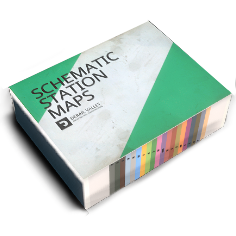Braking Overview/sv: Difference between revisions
Updating to match new version of source page |
Updating to match new version of source page |
||
| Line 8: | Line 8: | ||
</div> | </div> | ||
<div class="mw-translate-fuzzy"> | |||
Typerna av bromsar är: | Typerna av bromsar är: | ||
</div> | |||
<div class="mw-translate-fuzzy"> | <div class="mw-translate-fuzzy"> | ||
| Line 21: | Line 23: | ||
Some of the main risks associated with brakes are: | Some of the main risks associated with brakes are: | ||
* Parked trains turning into runaways due to {{pll|Cylinder Leaks|brake cylinder leaks}} and no applied {{pll|Handbrake|handbrakes}}. | * Parked trains turning into runaways due to {{pll|Cylinder Leaks|brake cylinder leaks}} and no applied {{pll|Handbrake|handbrakes}}. | ||
* Forgotten applied {{pll|Handbrake|handbrake}} resulting in hindered {{pll|Vehicle Catalog Overview|pulling power}}. | * Forgotten applied {{pll|Handbrake|handbrake(s)}} resulting in hindered {{pll|Vehicle Catalog Overview|pulling power}}. | ||
* Badly set up {{pll|Air Brake System Overview|brake pipe valves}} leading to limited brake availability. | * Badly set up {{pll|Air Brake System Overview|brake pipe valves}} leading to limited brake availability. | ||
* Traction loss resulting in {{pll|Wheelslide|wheelslide}} if brakes are applied too hard in {{pll|Weather|wet conditions}}. | * Traction loss resulting in {{pll|Wheelslide|wheelslide}} if brakes are applied too hard in {{pll|Weather|wet conditions}}. | ||
| Line 27: | Line 29: | ||
* Incorrectly setup {{pll|Brake Cutout|brake cutout valves}}, resulting in dysfunctional {{pll|Train Brake|train brakes}}. | * Incorrectly setup {{pll|Brake Cutout|brake cutout valves}}, resulting in dysfunctional {{pll|Train Brake|train brakes}}. | ||
* Excessive {{pll|Dynamic Brake|dynamic brake}} use leading to {{pll|Powertrain Overheating|powertrain overheating}}. | * Excessive {{pll|Dynamic Brake|dynamic brake}} use leading to {{pll|Powertrain Overheating|powertrain overheating}}. | ||
</div> | |||
<div lang="en" dir="ltr" class="mw-content-ltr"> | |||
==== Warnings ==== | |||
</div> | |||
<div lang="en" dir="ltr" class="mw-content-ltr"> | |||
Depending on the session {{pll|Difficulty|difficulty settings}}, a flashing warning light above the {{pll|Monitoring|brake pipe gauge}} indicates some problems with the braking system. It may mean: | |||
* There is a {{pll|Handbrake|handbrake}} applied somewhere on the train. | |||
* One of the {{pll|Air Brake System Overview|brake pipe valves}} is incorrectly setup somewhere on the train. | |||
* There are more than one {{pll|Brake Cutout|brake control devices cut in}}, or none is, on the train. | |||
</div> | </div> | ||
[[Category:Braking|1]] | [[Category:Braking|1]] | ||
Revision as of 19:14, 17 March 2025
Bromsar är enheter som finns ombord på järnvägsfordonen som används för att bromsa dem, få dem att stanna eller hålla dem stilla. Det finns flera olika typer av bromsar som vanligtvis finns på motoriserade och andra fordon, där var och en är fördelaktig för ett visst ändamål. De styrs var och en av en individuell kontroller, vanligtvis en spak eller en vev som kan vara placerad inuti hytten eller på fordonets utsida.
Ansättning av bromsar görs nästan alltid i riktning bort från föraren. Detta för att föraren i nödfall kan skjuta alla spakar framåt som en säkerhetsåtgärd, utan att behöva tänka på varje kontrolls individuella reglage.
Typerna av bromsar är:
Tågbroms:
Används för att bromsa eller stoppa tåg.
Risks
Some of the main risks associated with brakes are:
- Parked trains turning into runaways due to brake cylinder leaks and no applied handbrakes.
- Forgotten applied handbrake(s) resulting in hindered pulling power.
- Badly set up brake pipe valves leading to limited brake availability.
- Traction loss resulting in wheelslide if brakes are applied too hard in wet conditions.
- Prolonged mechanical brake usage resulting in brake shoe overheating and loss of braking power.
- Incorrectly setup brake cutout valves, resulting in dysfunctional train brakes.
- Excessive dynamic brake use leading to powertrain overheating.
Warnings
Depending on the session difficulty settings, a flashing warning light above the brake pipe gauge indicates some problems with the braking system. It may mean:
- There is a handbrake applied somewhere on the train.
- One of the brake pipe valves is incorrectly setup somewhere on the train.
- There are more than one brake control devices cut in, or none is, on the train.
